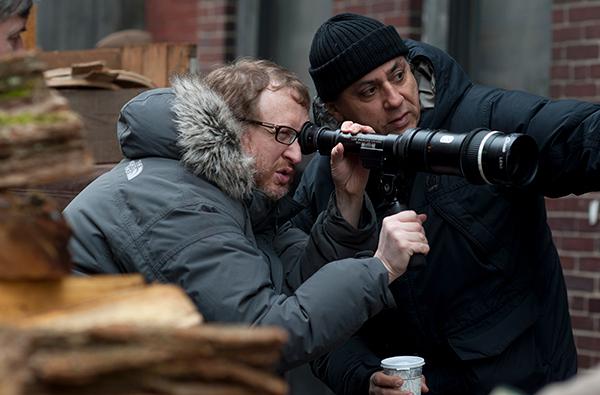James Gray, the explorer
POSTED ON 15 october 2022
In a handful of films that play with shadows as only the great formalist filmmakers can, James Gray has become an auteur in a class of his own, an artist who reinvents grand classic cinema.
James Gray, who wanted to be a painter, sketches a cinema of splendid evasion, slow as a hallucinated procession, of worlds that have vanished and yet become greatly sought after. There is the search for an improbable golden civilization in the Amazon Forest pursued by the ‘immortal’ adventurer of The Lost City of Z (2016), which turns into a subversive acceptance of the beyond. There is the quest of an astronaut (Tommy Lee Jones in misanthropic mode), obsessed with a mythical galaxy, that invades Ad Astra (2019). Through space, the jungle, or through the streets of New York, including those of his native Queens in Armaggedon Time (2022), the director tracks down images haunted by the characters of failing fathers from whom one must break free.

© A. Joyce - Worldview Entertainment - Kingsgate Films - Keep your head / DR
Horrendous yet heartbreaking, unable to fulfil the destinies they set out for themselves, fathers are the great proponents, the poignant impulses of the filmmaker's movies. They are the great New York cop (Robert Duvall, resolute and impenetrable) in We Own the Night (2007), or the self-doubting plumber with big dreams (Jeremy Strong, wearing a perpetual straight face) in Armaggedon Time. Whether real or metaphorical, these characters are authoritarian, cruel, restless… and secretly loving.
Confronting these flawed father figures is youth, torn between hope and desire. In Gray's work, childhood persists even in adulthood, as depicted by Brad Pitt's uncertain and youthful look as the eternal Telemachus in the Ad Astra odyssey. Youth is full of sensual sorrow, embodied by Joaquin Phoenix, always unstable, but ready to enter the arena as a nightclub hero in We Own the Night, or a bipolar man hiding at home, who has a talent for dancing in Two Lovers (2008). Youth is organic, flexible. It can endure more than anything or anyone because it is incredulous, like the silent and inert son in The Yards (2000). As Truffaut once said of young people, "Everything happens to them for the first time". Paul Graff, the teenager in Armaggedon Time, is beaten up, but he keeps in mind that he must try everything anyway, thanks to his grandfather, who teaches him about the family past, that of a vanquished world (again)..
Gray has never ceased returning to his own past, that of a Ukrainian Jewish family. From his first film, Little Odessa (1994), set under the black metal bridges of the Russian-Ukrainian district of Brighton Beach, the filmmaker tells the tragic story of a son who disowns his father, only to be destroyed by crime. The Polish emigrant in The Immigrant (2013), constantly conscious of where she comes from, grasps at everything, however obscure, to try to build a future for herself. For James Gray, not forgetting means sharing, without nostalgia, a way to shake things up. Recalling his childhood in Armaggedon Time, he portrays a society where, in the 1980s, an African American child was always automatically guilty. A bloodstain on the foot of this very young character symbolises the vulnerability of beings in the face of racism. The organic detail sums up Gray's cinema, a work that is highly thought out, yet rendered in a purely visual way. This combination of intellect and instinct makes Gray a deeply moving filmmaker.
Virginie Apiou
Sunday screenings:
The Lost City of Z by James Gray (2017, 2h21)
Pathé Bellecour Sun. 16 10:45am
Armageddon Time by James Gray (2022, 1h55)
Institut Lumière Sun. 16 5:30pm
We Own the Night by James Gray (2007, 1h57)
UGC Confluence Sun. 16 6:30pm
Little Odessa by James Gray (1994, 1h38, prohibited for ages -12)
Pathé Bellecour Sun. 16 7:45pm

